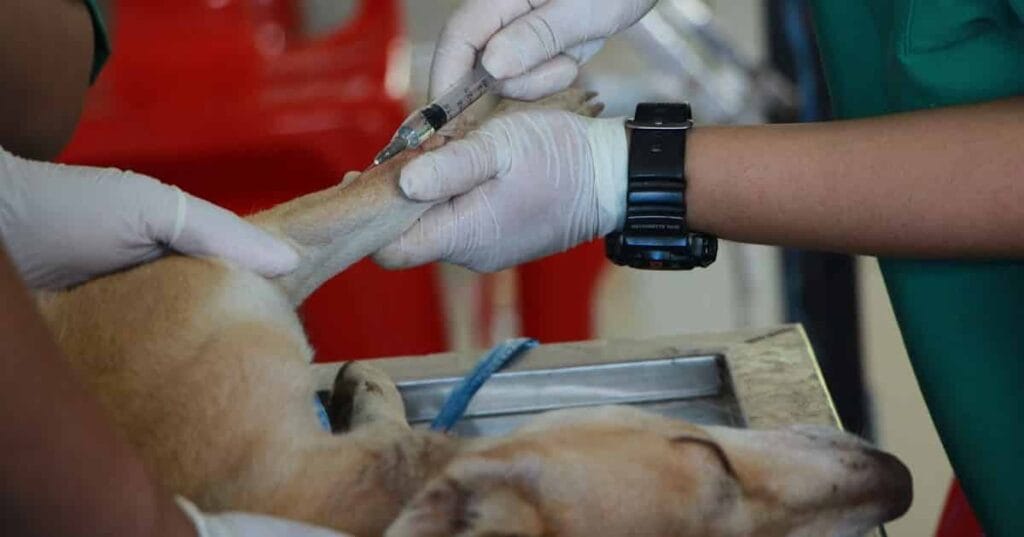“Every superhero needs their suit of armor—your puppy needs vaccines to protect them from dangerous diseases.” This article focuses on what vaccines does a puppy need and explain why each one is essential. We will discuss the different types of vaccines, the recommended vaccination schedules, and easy-to-follow tips to ensure your puppy grows up healthy and strong.
Table of Contents
Why Vaccines Are Essential for Your Puppy
Vaccines are like a security blanket for your puppy’s immune system. They teach your puppy’s body how to fight off dangerous germs without having to get sick first. When your puppy receives a vaccine, a small part of the disease is introduced in a safe form, allowing their body to build defenses against the real infection later on. This simple process can protect your pet from illnesses that might otherwise lead to severe health problems or even death.
Core Vaccines: The Must-Haves for Every Puppy
Veterinarians agree that there are certain vaccines every puppy should have. These are known as core vaccines. They protect against common and dangerous diseases that can spread quickly if left unchecked.
- Canine Distemper:
- What it is: A highly contagious virus that affects the respiratory, gastrointestinal, and nervous systems.
- Why it matters: Distemper can be fatal, and no cure exists once a puppy is infected.
- Canine Parvovirus:
- What it is: A virus that causes severe vomiting and diarrhea, leading to dehydration.
- Why it matters: Parvovirus is extremely contagious and can be deadly if not treated promptly.
- Canine Adenovirus (Type 2):
- What it is: A virus that causes respiratory illness and is related to a more severe virus causing infectious hepatitis (Type 1).
- Why it matters: The vaccine for adenovirus Type 2 also helps protect against the more dangerous hepatitis virus.
- Rabies:
- What it is: A fatal viral disease that affects the brain and spinal cord.
- Why it matters: Rabies is a public health risk and is required by law in many areas. Vaccinating your puppy not only protects them but also helps keep your community safe.
Non-Core Vaccines
While core vaccines are necessary for every puppy, there are also non-core vaccines that may be recommended based on your pet’s lifestyle and risk factors. These vaccines are optional and are given based on factors like geographic location, your puppy’s environment, and potential exposure risks.
Sponsored Ads
- Leptospirosis:
- What it is: A bacterial disease that can affect both dogs and humans.
- Why you might need it: Puppies that live in or frequently visit areas with standing water or wildlife might be at higher risk.
- Bordetella (Kennel Cough):
- What it is: A contagious respiratory disease.
- Why you might need it: If your puppy will be socializing with other dogs in kennels, groomers, or dog parks, this vaccine can be very helpful.
- Canine Influenza:
- What it is: A virus that causes respiratory illness similar to human flu.
- Why you might need it: Puppies in high-density areas, such as shelters or busy urban settings, might benefit from this vaccine.
Vaccination Schedule
Puppy vaccination protocols typically begin between 6 and 8 weeks of age and continue until approximately 16 weeks. The following guide outlines what to expect during this initial period:
- 6-8 Weeks:
- Puppies receive their first round of core vaccines. This may include the distemper, parvovirus, and adenovirus vaccines.
- 10-12 Weeks:
- A second round of core vaccines is administered. Some veterinarians might add non-core vaccines like Bordetella during this period, depending on the puppy’s exposure risk.
- 14-16 Weeks:
- A final round of core vaccines is given. Rabies vaccination typically occurs around this age, but this can vary based on local laws and the veterinarian’s recommendation.
FAQs
- What happens if a puppy isn’t vaccinated?
Without vaccinations, a puppy is at a high risk of catching dangerous diseases like parvovirus, distemper, and rabies. These diseases can be very serious and sometimes even fatal. - What happens if a dog’s vaccination is delayed?
If a dog’s vaccination is delayed, the dog remains unprotected for longer. This can make it more vulnerable to infections, especially if it comes into contact with sick dogs or contaminated areas. - At what age should a puppy be vaccinated?
Puppies usually start their vaccinations around 6 to 8 weeks old. They then receive booster shots every 2 to 4 weeks until they are about 16 weeks old. - At what age do you stop vaccinating your dog?
After the initial puppy series, dogs get booster shots. Depending on the vaccine and your veterinarian’s advice, many core vaccines are given every 1 to 3 years throughout a dog’s life. - Can I vaccinate my puppy on my own?
No, vaccines should be given by a veterinarian. A vet knows the correct dosage, proper injection techniques, and how to monitor for any side effects. - What is the first vaccine given to a puppy?
The first vaccine is usually a combination shot (often called DA2P, DHPP, or DAPP) that protects against diseases like distemper, adenovirus (hepatitis), and parvovirus, and sometimes parainfluenza. This shot is typically given around 6 to 8 weeks of age. - Is it OK to skip a dog vaccine?
Skipping vaccines is not recommended. Vaccinations protect your dog from serious and sometimes deadly diseases. Missing vaccines can leave your pet unprotected and at risk. - Do dogs live longer without shots?
No, dogs do not live longer without vaccinations. Vaccines are essential for preventing dangerous diseases that can seriously harm your dog and even shorten its life.

